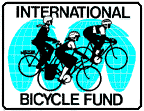America: Bike, Non-motorized & Sustainable Transport; Caribbean, North, Central, Latin And South

![]() IBF is 100%
IBF is 100%
solar powered
![]()
Advocacy Organizations and Clubs in the Caribbean, Latin, Central and South America
Advocacy Organizations and Clubs in North America
Bicycle Messengers and Activism in San Francisco
Honduran Activist Achieve Healthier Environment
Cuba People-to-People Programs
IBF's Cuba: Bibliography / Reading List
IBF's / Bicycle / Development / Sustainability Bibliography / Reading List
Bogotá's Ambitious Bicycle Agenda
- After 2 years of work (1999-2001), Bogotá, Colombia, now has approximately 186 km. of cycle paths. There is still a lot to do, specially in the education of drivers and of cyclists, but it is the largest bicycle scheme in Latin America.
Cleaner Air In Mexico City?
- For years Mexico City has been on the list of the worst air polluted cities in the world, much of it coming from automobiles. Recently, official have taken more steps, similar to those in southern California to reduce and clean-up automobile traffic. Leading the grassroots effort to make the city more environment- friendly and bicycle-friendly, has been the Movimiento Bicicletero (may be defuncted.)
Lima's 30 Year Bicycle Program
- In 1990 Metropolitan Lima, Peru, is embarking on a program to encourage bicycle transport that is scheduled to extend to the year 2020. The 'Progama de Transporte Popular de Vehiculos No Motorizados' contains three aspects: infrastructure, development of standards and promotion.
- The initial phase of infrastructure development includes seven priority bike route projects, with a total distance of 70 kms (43 miles) and construction of 500,000 bicycle parking spaces. The first of these, along Ave. Argentina, was completed in 1993 and the others should be completed within the year. The medium term goal is 140 kms and long term plans call for 210 kms.
- To help standardize the use of bicycles and implementation of the plan calls for; a manual with the regulation for the circulation of cyclist. And development of technical standards for the design and planning of cycle ways.
- The third element is to establish a program promoting good bicycle use. Pamphlets, post and radio spots have been produced and distributed. In 1991 and 1992, the city got 2000 and 3000 bicycles, respectively, to be sold on installments to employees.
For more information contact: Jenny de Testino, Los Mangles No 3, Urbanizacion Bellatrix, Surco, Lima 33, PERU.
1998 UPDATE: A total length of 60 km of bikepaths has been completed on Avenida
Colonial, Avenida Universitaria and Avenida Tomas Valle. The objective of the
program is to provide a low cost, affordable transport alternative (bicycles) to low
income people living in the densely populated 'Cono Norte'of Lima, and working in the
industrial zone of Lima-Callao. The program includes credit facilities for the
purchase of bicycles (only for low-income workers) and a social communication campaign to
promote cycling and to educate road users how to behave in encounters with cyclists.
Another important project is the World Bank supported bicycle program in Santa Fe de
Bogota (Colombia), which includes the development of a Bicycle Masterplan Study and the
construction of bicycle facilities along the Calle 80, one of Bogota's main traffic
corridors.
Source: Paul Guitink, Taskmanager, World Bank, PGuitink@worldbank.org
Home | About Us | Contact Us | Contributions | Economics | Education | Encouragement | Engineering | Environment | Bibliography | Essay Contest | Ibike Tours | Library | Site Map | Search
![]()
The International Bicycle Fund is an independent, non-profit organization. Its primary purpose is to promote bicycle transportation. Most IBF projects and activities fall into one of four categories: planning and engineering, safety education, economic development assistance and promoting international understanding. IBF's objective is to create a sustainable, people-friendly environment by creating opportunities of the highest practicable quality for bicycle transportation. IBF is funded by private donation. Contributions are always welcome and are U.S. tax-deductible to the extent allowed by law.
![]()
![]() Please write if you have questions, comment, criticism, praise or
additional information for us, to report bad links, or if you would like to be
added to IBF's mailing list. (Also let us know how you found this site.)
Please write if you have questions, comment, criticism, praise or
additional information for us, to report bad links, or if you would like to be
added to IBF's mailing list. (Also let us know how you found this site.)
